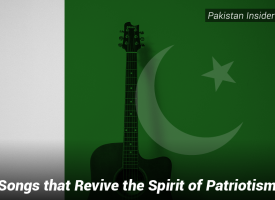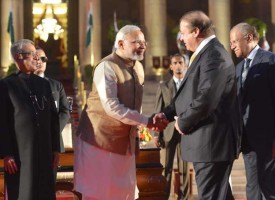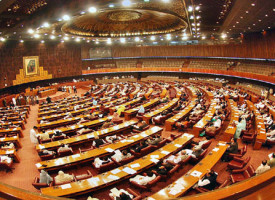DISCLAIMER: “Opinions expressed here are solely of the author. Pakistan Insider does not necessarily agree with its content”.
Clarification: https://insider.pk/general/clarification-from-team-pakistan-insider/
Before I come to the actual body of this article, it is important to shed light on lesser known historical facts; facts which most Jews and Muslims, or Israeli and Pakistanis to be precise, would not want to acknowledge. Despite the visibly clear disconnect between Tel Aviv and Islamabad, both countries have over the past decades maintained some, if not considerable, level of cooperation.
I am certain that a vast majority of this article’s readers will have started fuming after reading the paragraph above. The very notion that Pakistan could somehow be in touch with Israel will set many fanatics on fire. Apart from bigoted hardliner clerics, ultra-nationalist ‘jingoists’ will also be wondering what the purpose of this piece is.
Let me be clear. The purpose of this article is neither to praise nor to malign Israel. In fact, it bears no policy recommendations at all. It is only an individual attempt at presenting strong reasons why there is nothing ‘dangerous’ or ‘insidious’ in enhancing ties with Israel.
We live in a complex day and age. As technology has advanced and brought the world much closer, it has divided humanity to the same degree. We talk of a ‘Global Village’ and yet we cannot tolerate different communities inhabiting our planet. Our quest for resources, minerals and international prestige have resulted in unending wars, battles and fights.
Bearing in mind the intent of this article to present food-for-thought, let us know examine the 5 reasons why there is nothing wrong in Pakistan recognizing Israel:
1. Solution To The Palestine Issue
There are several Muslim states which maintain diplomatic relations with Israel, Turkey being the most prominent. Unlike Saudi Arabia or Iran, Turkey has been successful in bringing Israel to the negotiating table for serious rounds of peace talks with the Israeli leadership. Egypt too has been facilitating peace talks between Tel Aviv and fighters in Palestine. Egypt’s late spy chief Omar Suleiman, former leader Hosni Mubarak, Turkey’s Erdogan and his predecessors, all helped in hosting discussions with Israel. Readers will be interested to know that even Saudi Arabia’s monarchy, the self-professed guardians of Islam, communicated secretly with Israel at least five times since 2014 on the Iran issue.
An enemy’s enemy is a friend and on the other hand, desperate times call for desperate measures. Israeli Prime Minister Benjamin Netanyahu’s speech before the UN General Assembly reeked of the same pressing concerns for them which had everything to do with Iran. The Saudi kingdom has been urging Washington, common ally between Tel Aviv and Riyadh, to note the common concerns.
While it is true that Iran is as much involved in geosectarian politics as are their Saudi counterparts, Pakistan sits quietly to the East observing these developments. Pakistani representatives at the UN frequently condemn Israel’s apparent atrocities and call for “a peaceful two-state solution to the Palestine problem”. In his recent address before the UN General Assembly, Pakistani Prime Minister Mr Muhammad Nawaz Sharif declared with disappointment that, “The accepted avenue for peace between Palestine and Israel – a two state solution – appears further away today than ever before, due to the intransigent stance of the occupying power.”
Meanwhile, Pakistan refuses to officially recognize Israel’s very existence. In today’s age, this could be the joke of the millennium itself. Why should Israel, a country considered by Jews as their homeland, take Pakistan’s condemnations and appeals seriously if the latter doesn’t even recognize it? Frankly speaking, Pakistan’s empty firing in the air in support of oppressed Palestinian “brethren” is getting more farcical by the day. Claims of pushing for meaningful talks have become hollow. Iran and Saudi Arabia, as mentioned earlier, are caught in their own regional power-grabbing tussles. Turkey under Erdogan has adopted a more hardliner approach after the dreaded Israeli raid on an aid flotilla to Gaza several years ago which deeply severed Turkish-Israeli ties.
Unless Pakistan recognizes Israel as a reality which cannot be ignored further, the possibility of bilateral and later multilateral dialogue (involving Palestinian stakeholders) cannot be envisaged. If I am to put forward my arguments and terms to someone, I have to first accept he is alive and present in front of me. If I keep shutting my eyes and proclaim no one is here, who am I fooling? Why then, am I wasting time making a joker of myself?
The first pragmatic step therefore, is recognizing Israel i.e. that in this age, whether by force, coercion or occupation, Israel is a reality. It has a national infrastructure. Almost the entire world deals with it, and if we really wish to do something meaningful for our Palestinian brothers, we should let go of the false bravado we put up in front of the Muslim ‘Ummah’ and act pragmatic for the greater interest of world peace.
2. Pakistan And Israel Both Are Ideological States
It is a well-known fact that Pakistan and Israel both are nation states which came into being as the result of strong ideologies. Jews consider Israel as their ‘promised land’ and Pakistanis consider their country a ‘divine gift’. Unlike Christianity which limited itself to papacy in the tiny Vatican City, Jews and Muslims have their own political, social, economic and legal systems, apart from sets of rituals and dogmas.
Let’s be honest with ourselves here. Viewed from an alternative perspective, Pakistan too could be equated with Israel’s occupation of Western India. Similarly, the House of Saud in Saudi Arabia and Ayatollah clergy in Qom, Iran can be accused of being “Zionists” in their own right i.e. usurping power and misusing it to terrify and subjugate people.
It is all a matter of perspectives, simply put. My community’s wrongs will be right for me, because it is my community.
Imagine Muslims of the world choosing Pakistan to be their centre of gravity and establishing their Caliphate. A few years later Jewish states would circle this Islamic state from all corners and pose grave security threats. The same is happening with Israel. This is why many of Israel’s security concerns for its people are seemingly understandable (mind you, each community thinks and gives priority to the well-being of its own people, just like we do. The “my-countrymen-should-be-protected-at-all-costs” principle).
Since Israel and Pakistan were established on the basis of respective religious ideologies, it must be viewed as a greater Jewish-Muslim engagement, a meeting of civilizations, if you may. Taking inspiration from the landmark Charter of Madina, Pakistan can put forth concerns of the Islamic world with representatives of the Jewish faith. The ultimate objective is to engage in meaningful dialogue.
3. Pakistan Is A Nuclear-Armed Islamic Republic
The fact that even today Pakistan is the world’s only nuclear-armed Islamic Republic should not be taken lightly. Most importantly, Pakistan’s track record of receiving acknowledgements from IAEA and being a responsible nuclear state add credence to its aspirations for being a formidable representative of Muslims around the world.
Albeit clandestine, Israel too has a full-fledged nuclear programme to protect itself from external hostilities if the need arises. Deterrence is both a force multiplier and warning signal, hence both states know well that none can outsmart the other’s capabilities. Missiles are missiles and bombs are bombs, they are never used to joke around. Their existence has more to do with political messaging than actual use (let’s hope the need never arises).
4. More Openness Equals More Understanding
Israeli Mossad was covertly helping American CIA and Pakistani ISI smuggle weapons against the Soviet troops in Operation Cyclone. Former ISI chief Lt Gen (retd) Ahmed Shuja Pasha had reportedly shared critical counter terrorism intelligence with Israel post Mumbai attacks of 2008. ISI and Mossad have been sharing intelligence from time to time via their embassies in the US, Turkey and Jordan.
They say that one should keep his friends close and his enemies closer. I do not know if Israel is Pakistan’s enemy. But what I do understand is that the current state of rejection is clearly a self-created dead end. Diplomats are, after all, given the gruesome task of smiling with, greeting and having lunch with their worst of enemies simply to project their countries as tolerant and civilized. They have their respective national agendas to push. Sitting idle is not an option.
As Foreign Minister under the regime of General (retd) Pervez Musharraf, Khurshid Mehmood Kasuri had tried to initiate diplomatic relations with his Israeli counterpart Silvan Shalom. As expected, widespread outrage spread out across Pakistan after which both Kasuri and Musharraf were accused of being “Qadyanis”, “Jewish puppets” and what not.
Perhaps one day after dialogue, both Islamabad and Tel Aviv can bring Palestine onboard and finally devise a long-lasting solution to their territorial problems once and for all? A solution which will be supervised and approved by the UN and OIC?
Another reason why Pakistan should consider ties with Israel is the India factor. This is akin to New Delhi’s love affair with Moscow until the Brahmins opted for Washington and Russia was compelled to extend a hand of friendship to Rawalpindi / Islamabad. India is making huge investments in Chabahar port of Israel’s archenemy Iran to create a strategic land route from the Arabian Sea into Central Asia and eventually Europe. Taking advantage of this development which must surely have raised eyebrows across Israel, Pakistan can come to terms on a mutually-beneficial geostrategic alignment which will snub India, just as Pak-Russia ties are keeping several strategists in India restless.
5. Promoting Inter-Faith Harmony
As ideological representatives of Judaism and Islam, Israel and Pakistan can foster a global atmosphere of inter-faith harmony, understanding and research to prevent radicalization and subsequent militancy from either sides. Under the UN umbrella, perhaps, Israel and Palestine can help keep checks and balances on illegitimate, unjustified activities of radicalized Zionists and indoctrinated “jihadis”.
The Abrahamic faith creates a strong bond of peace and tolerance among Jews and Muslims. The common patriarch to the most famous prophets in Judaism and Islam, the Prophet Abraham (Ibrahim, peace be upon him), can be declared as a symbol of harmony among the communities. Armed militants on Jewish and Muslim circles can be persuaded to drop arms and use their tongues, pen and paper to do dialogue and exchange views / ideas instead of bullets and bombs.
Conclusion
While it is true that Pakistan’s founding fathers were skeptical and openly critical of Israel, which was established just a year after their own independence (in 1948), times have considerably changed. Changing times demand revised strategies and modes of engagement. Israel was a tiny population of ambitious Zionist Jews back then, I am pretty sure that seeing what it has become today, Quaid-e-Azam Muhammad Ali Jinnah would not have hesitated in inviting them for talks, if he considered it best for Pakistanis in specific and the Muslim world in general.
Realpolitik demands persistent pragmatism and discarding of bigoted sentiments. A hate-oriented approach will only add fuel to the fire.








Z Khalid! You need to get your head checked. How can you go against our sovereign nation’s policy (not recognizing Israel) and most importantly how can you suggest something that is completely out of line with our religion. There you go, majority of your readers will stop reading my comment after the first sentence because they have a tendency to read headlines and jump to conclusions. I really appreciate you for sharing your insights. It was a well written article. I agree with all your points. Unfortunately, I can’t say the same about the audience. And I am not talking about the majority of Pakistanis who are poor and un-educated. I am addressing the so called “educated” citizens, such as Doctors, Lawyers, Engineers, Journalists etc. There is a difference between knowing certain skills, following instructions than thinking critically and questioning what is pushed down your head. I love this response from you “I appreciate your feedback and thank you for sharing your views in a dignified manner.” It made me chuckle. Most Pakistanis that I come across (Yes, I am also a Pakistani) are extremely proud of their nation and suffer from Delusion of Grandeur. I call them hypocrites. Now I wont go in detail why I think they show signs of hypocrisy in their thought process. You know very well what I am talking about.
So coming back to your topic. I don’t know as much details or in other words conspiracy theories as these idiots do but I do believe that the geo-political landscape is shifting rapidly. Now, I definitely condemn Israel’s violations of human rights, especially the settlements issue, but the problem wont be solved by just shoving your head in the sand like an ostrich. I think if Pakistan is in Israel’s position, they will probably conduct more human rights violations to its version of Palestinians than Israelis. Look at the state of our nation. Look how badly we treat our own citizens, especially our minorities.
– Pakistanis should read books and learn to think critically.
– Israel is not full of Zionists whose sole purpose is to destroy Islam. They have made significant contributions to the society in terms of technology, healthcare, banking (lol :)) etc.
– There are over a million (~20%) Arabs who live in Israel. Out of which 70% are Muslims. So about 700,000 Muslims are citizens of Israel.
– Pakistanis should stop blaming Israel and India for its shitty conditions. We are mostly responsible for it. Now I say mostly because there is no denying of foreign influence. And why would there not be?! We are one of the most corrupt countries in the world. It’s not hard for foreign agents to cross over and do what they want to do while our leadership acts like prostitutes on a sidewalk.
– We really have to come out of the dark-ages mindset. It is not cute any more. A lot of progressives would blame Saudi Arabia for the fundamentalist transformation in Pakistan. That is definitely a fact. I personally think Saudi Arabia is going to suffer because of its own demons.
– There is no such thing as Muslim Ummah in today’s age. It is every nation of itself. We have to strenghten Pakistan from inside. We can’t provide basic necessities for our citizens. Why the hell do we care about what is happening thousands of miles away.
– Infact we should take inspiration from Israel. It is such a small nation. You can literally drive end to end in about 2-3 hours. That nation has a huge influence in the world now. Look at our country. We have so many resources, seaports, crops etc. Still we our quality of life is on the opposite end.
End of my rant lol.
My, that was quite a reply! I disagree with some of your observations near the conclusion but respect your opinion nonetheless.
Personally, I believe we should have a channel of communication with Israel open which does not equal to friendship or any sort of tacit approval of its crimes. On the other hand, I wonder what use proxy warfare has had for the betterment of Palestinians by Gulf countries and Iran who channel them with money and weapons to fight “on their behalf” as useless assets who get killed for cheap. The very fact that innocent people are indoctrinated and used to force Israel into accepting “Ummah’s terms” is not feasible and has no long term benefit at all accept a few minor and temporary international outcries now and then. The best way to help Palestinians is to engage Israel eye-to-eye and take reps from Palestine onboard for an all-inclusive two-state solution in which people of Abrahamic faiths can live in peace and harmony.
Thank you for the feedback.
i appreciate your article, But i would like to highlight the quotes from QURAN because QURAN is the guidance for all humanity and Muslims, as ALLAH subhan Tallah has already said in it ” jewish will never be your well wisher”. thats it,Quran words are utter by Allah SubhanTallah,which means we cannot further argue on it to being a Muslim, because these jews are hypocrite ,(munafiq),,by their deep heart they are extreme enemies of Islam muslim UMA, dnt you see whats happening in SYRIA, YEMAN,LIBYA,IRAQ,LEBNON, these muslim states are now failure states, this is all because of Jewish Lobby to make GREATER ISRAEL and some how exactly these jews working on their Plan, killing millions of Muslim uma.,i apologze if my words means any offence to you.
i will close this , for instanc to agree with your article on one condition, IF Israel Withdraw all his military operations from all over the captured areas in Palestine-Ghaza and announced to reconstruct the homes for Palestine give them basic necessities supplies to live prosperous life as like people living in Jews captured areas, provide them jobs, citizenship fully-fledged honer to every Muslim and further announced APOLOGY to all Muslim whatever he did to slaughter the millions of MUSlims innocent child,pregnant woman(i hope so you have seen the bombing whenever Israel starts in Palestine’s Muslim colonies), ,This will be only most appreciated gesture from Israel leadership, after that its Pakistan and Muslim uma responsibility to speak with them, to start diplomatic relation Because this will show their sincerity as i said earlier these Jews are always MUnafiq,( as its also mentioned in Quran), this impression from Jews will soften the hearts of Muslims Political leaderships to talk with the Jews leadership .
I thank you for your constructive feedback and sharing your response in a dignified manner.
Well I agree with the Writer in some aspect. But we cannot consider Isreal as an Ideological State. As others said they were terriorists and are terriorist still. They dont have any fear of national Security as Stones can’t do anything against Bombs. We as a Muslim State failed to Help Palastine but we can’t do any thing as our own Country is Burning. First we should Built our Country strong Then we should focus on the rest of the world. We sacrificed alot for other Muslim Nations but in return we always got cheated by them i.e Afghanistan, Iran , Bangladesh. However it is the need of the hour that we have to join our heads and have to think for the betterment of Islamic world Eapecially For Kashmir,Burma and palastine..
I’d rather practice “lakum deenukum waliya deen” .
Zionism is simply intolerable so is bigotery. Strengthening ties with Israel is not the only way for Palestin issues and so. There are other ways around. I’d rather go for them.
Mr. Zahid. It’s surprising to know that you have no insight in the historical divide between Jews and Muslims. Specially in the light of what Jews has conspiring in past and are conspiring today. If any community so efficiently working day and night to create divide in Muslims is only Israel and Jews.
We know allah said in Quran that these Jews will never be your friend. Recognizing them is far and inshallah Pakistan will do to them what they deserve and fear from us.
I totally disagree with your views. Turkey and Egypt and others who accept Israel has disrespected all those Palestinians who died till now.
Please read Jews plans and there think tanks designs against Pakistan in particular and Muslims in general and then decide either we should engage diplomatic ties with them or no. Thank you
Recognizing Israel won’t do any harm but it will also make us the people who recognized a state which was made by snatching the land of muslims. It’s as simple as that if somebody snatches your land, you don’t just accept or recognize that it’s now theirs and if you do then you no longer can claim that the land is infact yours. This is the stance which Pakistan stands by today that the land doesn’t belong to Israel and Pakistan shouldn’t recognize Israel no matter what, unless until the state of Israel is shifted to USA or Europe where the jews were “killed”
JOKE OF THE CENTURY
i agree with the writer If u cannot even compete in the comity of nations as a state in nearly all fields and then think that when the israelis beat up the Palestinians whose leaders sit on the same table with the jews then whats the problem with us Pakistanis that we have no diplomatic relations with Israel At present we don’t exist for Israel except as another beggar nation but our not recognizing the state of Israel puts us and our nuclear arsenals in danger of being attacked whereas we shall be in no position to even reply to it as they can easily use their advance aircraft and India’s airspace / land to do so Use your brains as humans instead of keeping the big mass in your buffalo heads and think strategically as even Allah Almighty doesn’t help simple duffers
Can you really trust the State of Israel… can you trust the Mosad??
The issue isn’t about trusting, rather it is to sit across the table and confront a dark reality eye-to-eye.
Asalamualikum
This is my first visit on p insider.
I appreciate the writer who take some for our people who are suffering in there own homes without doing any wrong.
I also belong to the occupied state Jammu & Kashmir. I only want to say that we all Muslims esp Muslims of Kashmir have only faith in Pak the great.
you must think and make a design for our People in Philistine.
Brother khalid needs to hang his head in shame. Please don’t be presumptuous and assume the following is written in anger.
“The world Zionist movement should not be neglectful of the dangers of Pakistan to it. And Pakistan now should be its first target, for this ideological State is a threat to our existence. And Pakistan, the whole of it, hates the Jews and loves the Arabs. “This lover of the Arabs is more dangerous to us than the Arabs themselves. For that matter, it is most essential for the world Zionism that it should now take immediate steps against Pakistan. “Whereas the inhabitants of the Indian peninsula are Hindus whose hearts have been full of hatred towards Muslims, therefore, India is the most important base for us to work there from against Pakistan. “It is essential that we exploit this base and strike and crush Pakistanis, enemies of Jews and Zionism, by all disguised and secret plans.”
-David Ben Gurion, the first Israeli Prime Minister.His words, as printed in the Jewish Chronicle,9 August 1967″
This was said by the founding father of the zionist state.
1. Where do Baluchi terrorists who want to break up Pakistan based, where is their head office. Oh that’s right, israel.
2. Who supplies advanced opto electronics to the Indian army along the LOC. Oh that’s right it’s israel.
3. Which country was in advanced stages of planning to destroy Pakistani nuclear facilities along with India. Just like they did in Iraq and Syria. Oh that’s right it was israel.
Make no mistake as muslims we must respect the jews. They have been given the title of ” people of the book”
Should we respect or help zionist a?? Never.
After reading your Article and Recent Interview by Saudi Arabia’s interior Minister who Said Israel is Our Historical Cuzns… I feel the same way that rather than just Not accepting the fact we should accept it and recognize them and then decide Land for Palestine with them. I agree that our Islamic beliefs say that Jews can never be our friends however Give and Take can be a way to look into your own Interests. I Have been living in Canada for a while and Jews i saw are really humble with much Similar Beliefs as Muslims ie not Eating Haram Meat and All That. I appreciate the author for his great writing and putting it at Pakistan Insider Blog.
Israel is not an ideological state its a terrorist came into being by butchering Palestinians and was drawn in Balfour declaration by western powers…there’s only one state that came into being on the basis of ideology and i.e. Islamic Republic of Pakistan
However, the (weak) Muslim world should recognize Israel as a reality and accept their existence because they are real and they are there in the holy land…denying them is just like closing eyes and crying out loud for nothing…Ill suggest Palestinians to move to other countries as refugees rather losing their loved ones on daily basis because no one is willing to help them.
Throwing rocks and receiving bullets, rockets, bombs and what not in return doesn’t makes sense! I’m afraid we are helpless.
However I agree with Shujaat statement…
Jews/Israel will never bring any good to us being a Muslim country/community.
May God bless us.
Author/ Readers: You may disagree with my opinion.
I appreciate your feedback and thank you for sharing your views in a dignified manner.
I guess Jewish lobby is funding big time that they’re reaching us via insider.pk
Us living in today’s world doesn’t change the fact that Jews/Israel will never bring any good to us being a Muslim country/community.
I request all Muslims brothers and sister to raise voice against killing of small children and innocent Palestinians by Israel!!!
Dear Shujaat, your allegations of “Jewish funding” are a pitiful accusation worthy of no response. As the author of this post, I am watching with interest the reaction of my fellow Muslims with their abusive language and anger. Those who have read the heading of this post or some of its lines will obviously start cursing me, I hope to await constructive and intellectual responses from serious readers.
Pakistan Insider has given me the freedom of speech to present an alternative argument only for the sake of debate. Their sincerity and encouragement should not be judged negatively. False allegations without evidence are a sin, I’m sure you must be aware of that.